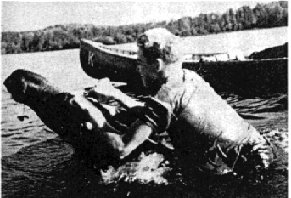
Moose
From Canoe Camping, by G.H. Evans, ISBN
0-498-01825-3, pages 108-109.
The moose is the largest, most formidable looking animal likely to be encountered. He frequents damp, wet, marshy areas in the north. Flies drive him into the water for protection and food. He is a vegetarian and is most normally encountered while rounding a bend in the stream or lake, to be discovered standing knee deep - or more - in water, occasionally dropping his head into the water to feed or drink. He will retreat to higher ground to bed down until the flies drive him back again, and so can be encountered at any hour of the day.
He travels the portage trails - as will any game - if that happens to be the easiest route, but rarely will he be seen along the route. He practically never stumbles into the canoeman’s camp.
His senses of smell and hearing are well developed, though his eyesight is less keen, and a canoe can approach quite close while he is in the water if made from downwind quietly. He will spot movement, but if he neither smells nor hears the canoe, the paddlers can often move closer when he dips his head into the the water if the canoe rests quietly, almost motionless, when he looks around. In moose country, travel should be along the shore, and quiet should be maintained, for he may be just around the next bend.
The female travels with her calf, but the bull with the massive rack is a loner and is completely disinterested in the cow except during the rut. After the mating season he drops his horns, to grow another set each year. Occasionally a horn dropped the previous winter is found lying in the bush, but rodents make quick work of them, and only a horn dropped in the water is likely to be found in good condition by the next summer. The horns are shed individually, so a pair is rarely found together, although having rubbed one off on a tree, the bull will try to free the remaining horn as quickly as possible. Early in the canoeing season his rack will still be in velvet-which lie rubs off as the spring and summer progress-but when the canoesman hits the water, his rack will be fully developed.
Occasionally, a swimming moose is encountered, or one
that can be forced to swim if the canoe gets between him and the forest. He
swims like a horse and is almost defenseless in the water. A canoe pair can
paddle faster than he swims, and the canoe can be paddled right next to him
without danger. Only his massive head will be held above water, and a bowman can
bop from the canoe onto the swimming moose for a ride with no danger-except from
the flies. The moose's back will be angled down-wards almost 45 degrees, so in
leaping aboard, the rider must grasp the ears or horns, or he will slip down the
moose's rump. Perhaps there could be some danger if the swimmer dives underwater
and encounters sharp hooves, but otherwise the rider is safe. The moose is so
intent on keeping his head above water, he can do no damage with either rack or
teeth - and will not try. He will tire quickly with a rider, who should
obviously slip off before the animal starts to flounder. A calf cannot support
the extra load, but the full-grown cow or bull has little trouble.

Swimmer grasps ears or horns to avoid sliding down
moose’s back.
As soon as the moose catches shore, the ride is definitely over. He will take to the bush with amazing speed and ability to navigate between trees even with his massive rack, and the rider on dry land will not stay in the saddle long.
The frightened moose will be heard pounding back into the bush for a short period, but quiet will soon reign as he picks his way through the forest. His memory is short, and as soon as the flies become unbearable, lie will be back in the water again, often in exactly the same area.
As the mating season approaches, the bull becomes a different animal. His horns become weapons to win from other bulls his cow or cows, and man may also become an enemy. The likelihood of his charging or even approaching man during the summer is negligible, but come fall, his search for the cow and willingness to fight for his right could make a chance encounter on the portage trail or campsite dangerous.